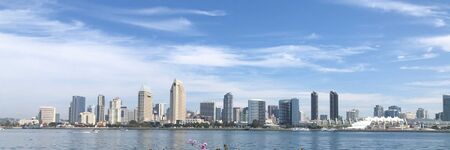San Diego CA
- Members
San Diego is a city in the U.S. state of California on the coast of the Pacific Ocean and immediately adjacent to the Mexican border. With a 2020 population of 1,386,932, San Diego is the eighth most populous city in the United States and second most populous in California (after Los Angeles). The city is the county seat of San Diego County, the fifth most populous county in the United States, with 3,338,330 estimated residents as of 2019. The city is known for its mild year-round climate, natural deep-water harbor, extensive beaches and parks, long association with the United States Navy and Marine Corps, and recent emergence as a healthcare and biotechnology development center.
Activities

|
Cajon Valley Union School District Electric Bus System | |
| San Diego Gas & Electric Cajon Valley Union School District Electric Bus System tests the technology that enables eight electric school buses to put electricity back on the grid when needed such as on hot summer days. A collaborative effort between SDG&E, the Cajon Valley Union School District and locally based technology company Nuvve, this is the first vehicle-to-grid (V2G) project to become operational in Southern California, helping to advance clean air and climate goals while also bolstering grid reliability. | ||

|
Chula Vista Smart Waterfront | |
| The Chula Vista smart waterfront is a 535 acre joint development by City of Chula Vista and the Port of San Diego – currently the largest waterfront development project on the U.S. West Coast. The development is groundbreaking in its approach to energy efficiency in (1) targeting 50 percent reduction in annual energy use for the development and (2) each building performing at least 15 percent better than Title 24 requirements in the California Building Energy Efficiency Standards. Recognizing the need to monitor and control this new energy infrastructure, the Bayfront project also focuses on the communications network technologies and smart infrastructure solutions that will provide operational efficiency, sustainability, and economic development opportunities for the City. The Project team, led by Black & Veatch, is focused on evaluating the three major components of energy, telecom, and smart infrastructure – determining solutions that will meet the aggressive energy goals and provide a foundational, scalable approach to future communications and smart city applications. | ||

|
Global High Impact Energy Efficiency | |
Objectives:
| ||
Details
Historically home to the Kumeyaay people, San Diego is frequently referred to as the "Birthplace of California", as it was the first site visited and settled by Europeans on what is now the West Coast of the United States. Upon landing in San Diego Bay in 1542, Juan Rodríguez Cabrillo claimed the area for Spain, forming the basis for the settlement of Alta California 200 years later. The Presidio and Mission San Diego de Alcalá, founded in 1769, formed the first European settlement in what is now California. In 1821, San Diego became part of the newly declared Mexican Empire, which reformed as the First Mexican Republic two years later. California became part of the United States in 1848 following the Mexican–American War and was admitted to the union as a state in 1850.
San Diego's main economic engines are military and defense-related activities, tourism, international trade, research, and manufacturing. The city is the economic center of the San Diego–Tijuana conurbation, the second most populous transborder metropolitan area in the western hemisphere (after Detroit–Windsor), home to an estimated 4,922,723 people as of 2012. The primary border crossing between San Diego and Tijuana, the San Ysidro Port of Entry, is the busiest international land border crossing in the world outside of Asia (fourth-busiest overall). The city's primary airport, San Diego International Airport, is the busiest single-runway airport in the world.









